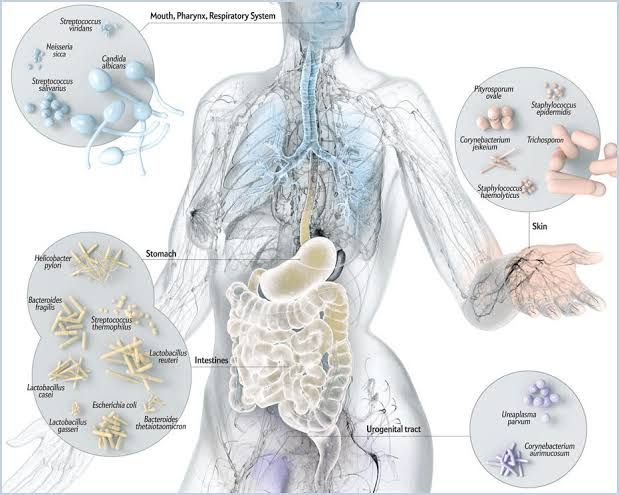Bacteria, Bacteria Everywhere!!!
Apr 25, 2019 • 167 views
Believe it or not, we all despise bacteria and germs when it comes to maintaining hygiene.
It's obvious we despise anything that is known to become a major cause of human diseases.
But you all will be grossed out by the fact that the human body is inhabited by a microorganism. They are estimated to outnumber human somatic cells and germline cells by a factor of ten.

This organism that lives on and inside the human body are known as normal microbiota.
The skin and mucous membranes harbor a variety of microorganism that is arranged in two groups:
Resident microbiota: It comprises a relatively fixed type of microorganism regularly found in a given area at a given age, if disturbed, it promptly establishes itself.
Transient microbiota: It consists of non-pathogenic or potentially pathogenic microorganism that inhabits skin or mucous membrane for hours, days or weeks. It is derived from the environment, does not produce disease, and does not establish itself permanently on the surface.
However, it resident microbiota is disturbed, the transient microorganism may colonize, proliferate, and produce disease.
Well, like a coin has two sides, the same way the presence of bacteria has two sides as well.
As common they are known to cause diseases but they are beneficial to humans as well.
That can be exemplified by yogurt we intake as the microorganism present in yogurt is beneficial for human gut health.
The microorganism that is constantly present on the body surfaces is commensals. Their flourishing in a given area depends on physiological factors of temperature, moisture, and presence of certain nutrients and inhibitory substances.
Their presence is not essential to life because "germ-free" animals can be reared in the complete absence of normal microbiota.
Benefits of human microbiota:

Resident microflora of certain areas play a definite role in maintaining health and normal functions
Microbiota in human intestinal tract synthesize vitamin k and aid in the absorption of nutrients.
Resident microbiota may prevent colonization by pathogens and possible disease through "bacterial interference"
They provide the first line of defense against microbial pathogens.
They play an important role in toxic degradation
Contribute to the maturation of the immune system.
Form dental plaques and save degradation of teeth
They synthesize biotin and folate
They metabolize dietary carcinogens
They also produce short-chain fatty acid chain which can lead to obesity by influencing fat deposition.
However, this resident microbiota can also cause disease when they enter the bloodstream or tissues and can cause severe diseases.
So now we have all the more reasons to hate and love these tiny-miny organism.
